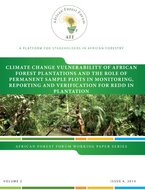Given the potential impacts of climate change on the commercial forestry sector, and the fact that such impacts can already be detected in Africa, the development and implementation of adaptation policies, measures and strategies are crucial. Although there is still uncertainty surrounding the magnitude and timing of climate change in the future, the negative impacts of this change are likely to be enormous. Thus, adaptation needs to occur in the immediate future. Processes need to be implemented now, as the time scales for these processes to take effect and be adopted are likely to be long in the case of plantation forestry. In implementing adaptation measures, a no regrets approach ought to take priority. The measures implemented under a no regrets approach will have benefits which are equal to or exceed their cost to society, and will be of benefit regardless of climate change. Other adaptive interventions will include:
a change in forestry practices to using and developing more heat and drought resistant species and hybrids; the use of native species ought to be encouraged since exotic species tend to negatively influence biodiversity; however, this should be balanced against aspects of productivity and brevity of rotation age, and thereby the undisputed economic advantage of plantations, which are main factors associated with the introduction of exotics;
mixing species, to provide insurance against some impacts of climate change, with plantation forestry moving towards mixed cultures rather than the currently dominant monocultures;
better matching of species to their optimal ecological range, that is, if the site is currently at the dry end of the species range, that species should no longer be planted there;
giving consideration to climate change predictions when planning the future of African countries plantation forestry in terms of species and provenance selection, tending, management regimes, production, consumption and trade of forest products;
the use of water harvesting methods to relieve water stress during the establishment stage in order to give seedlings and saplings a good start via irrigation. This intervention can be supplemented with the use of fertilizers and boosters in the early stages of the plantation establishment.
The study and assessment of the extent of vulnerability of African forest and tree plantations to climate change and monitoring the effectiveness of any mitigation and/or adaptation intervention requires a scientific method consistent with how plantations have been established and managed in the past. Such a method requires the use of a sampling framework that can produce the information necessary to feed the policy/management process. For as long as forest plantations have been established, management has deployed the use of permanent sample plots (PSPs) as a key part of a monitoring framework.
A temporary sample plot provides a snapshot of the attribute of interest, while a permanent sample plot allows for re-measurement over time that provides a dynamic picture of the attribute. Management of forest plantations in Africa has only put in place a few permanent sample plots to provide data for growth modelling, planning silvicultural interventions and harvesting cycles. A review in South African and Kenyan plantations found that the existing PSPs are inadequate even for plantation management purposes, mostly due to resource constraints. It is estimated that there exists less than 40% of the required number of PSPs in various states of management and monitoring.
In the wake of mitigation programmes like Reduced Emissions from Deforestation and Degradation (REDD+), permanent sample plots will be required to provide the necessary data for carbon accounting. Introduction of REDD+ in plantations in Africa will require a significant expansion of the number and location of the PSPs in order to obtain estimates of the carbon-relevant plantation attributes including below- and aboveground carbon density, detritus, products and decomposition profiles. Using a Kenyan study as a benchmark, it was estimated that in order to allow African plantations to fully participate in the REDD+ program, it will require at least 3000 PSPs to provide adequate data for aboveground biomass carbon stock for wall-to-wall monitoring, reporting and verification. It is recommended that each country with forest plantations establish a biometric department at the plantation management level that will be charged with the responsibility to establish an adequate number of PSPs, and to collect and transmit data to a central repository from which REDD+ stakeholders can have seamless access. A region or continent-wide network of these data centres and practitioners will reduce costs by cross sectional sharing of pertinent data.

